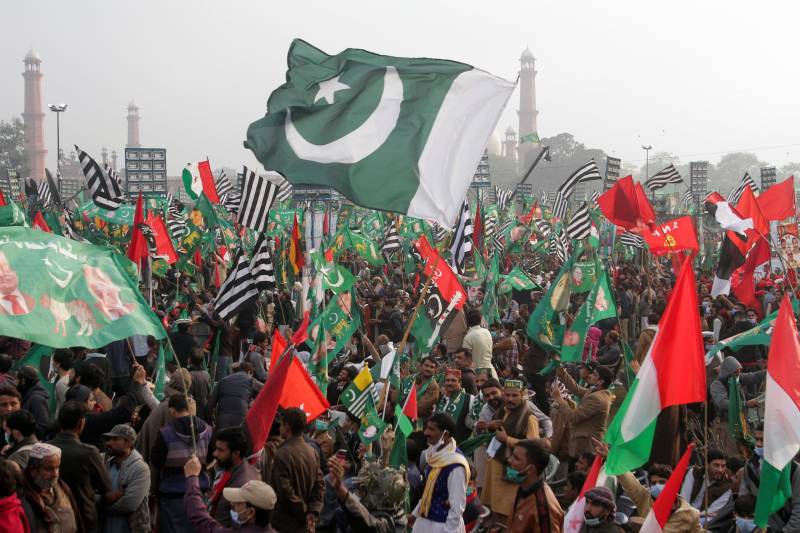
This article is intended for those who advocate for democracy in Pakistan. Let's explore whether the people of Pakistan uphold genuine democracy or if they merely adhere to an 'elite-centered democracy.'
The cornerstone of any democratic society is its constitution, which serves as a social contract. Elected representatives craft the constitution and enter into a voluntary social agreement on behalf of the people. Typically, a constitution's preamble states, 'we the people of [country x] hereby establish this constitution, our social contract.' A true democracy is often defined as a government of the people, by the people, and for the people, wherein citizens have the power to make decisions, including the right to vote for their leaders and participate in shaping laws and policies that impact their lives.
Let's examine the situation in Pakistan. Pakistan has experienced three major dictatorships (military rules), periods of democratic governance, and hybrid regimes at various times. Why do people celebrate when a military dictator forcibly takes control and disrupts the political order? Why does our Supreme Court legitimize such clearly unconstitutional actions? Following the last coup, the Supreme Court of Pakistan even granted the coup-maker the authority to amend the constitution as he saw fit during the initial three years of his rule. This is indeed astonishing. Isn’t it?
Renowned scholar Javed Ahmed Ghamdi highlights two fundamental questions that Pakistan needs to address: First, is it a regular nation-state or an Islamic Republic? Second, is it a regular state or a security state? These questions delve deep into the root causes of the challenges faced by Pakistan since its inception.
Let's tackle these questions one by one.
The slogan of Quaid-e-Azam and the All India Muslim League was "Pakistan ka matlab kia, la ilaha il-lallah." ZA Bhutto's 1973 Constitution and its Islamic provisions, such as Pakistan's formal name as the Islamic Republic of Pakistan, the Objectives Resolution forming a part of the Constitution, the establishment of the Islamic Ideological Council, the creation of the Federal Shariat Court, and the formation of an ad hoc Shariat Bench at the Supreme Court of Pakistan. General Zia's efforts to Islamize Pakistani society and the economy, including the introduction of hudood laws and attempts at riba-free banking. Nawaz Sharif's ambition to become the ameer-al-momineen via an Act of Parliament. Imran Khan's invocation of the "Islamic touch." The continuous growth of religious parties and groups since 1947. The role of religious leaders in our social and political life. All these instances illustrate that religion is deeply ingrained in our social fabric.
If Pakistan were to hold a referendum, what would its citizens choose: a secular state or a 100% Islamic Republic?
One of the primary challenges is the disconnect between the elite and the masses. The majority of the population, often uneducated or impoverished, feels marginalized. Historically, when religious elements became vociferous, the elite offered them concessions or used their religious zeal for the elite’s political gains, as seen in various examples given above.
Why not let the people decide through a referendum whether they prefer a genuinely Islamic Republic or a secular nation-state?
Some argue that an overwhelming majority would choose an Islamic government, regardless of whether they fully understand its implications. Concerns are raised about the potential for religious leaders, often perceived as extremists, to gain power. There is scepticism about their capability and impartiality, particularly concerning religious denominations they don't belong to.
Dr. Israr Ahmed, who dedicated his life to Islam, and his predecessor Maulana Maudoodi, emphasized the need to experiment with Allama Iqbal's ideology in Pakistan (khas hai tarkeeb mein Qaum-e-Rasool-e-Hashmi). They believed that failing to do so would strip Pakistan of its raison d'être.
The choice for all of us is clear: either we support democracy, or we don't. It's unfair and unjust to keep talking about democracy and the same time manipulate or even frustrate people's religious preferences. If you truly believe in democracy, then hold the proposed referendum, allowing both sides to present their arguments. Once the majority (or supermajority, if deemed necessary) decides, the constitution should be rewritten accordingly. Pakistan will either become a true "Islamic Republic" or a regular nation-state, addressing the first key issue identified by Ghamdi Sahib, an eminent social scientist. If the majority opts for a secular state, we lose the moral ground to remain separate from India and Bangladesh. If religion was a private affair, we would be better off if we formed a confederation with India and Bangladesh. A confederation would be good for everyone in particular the Muslims living in India. With three countries together, the combined Muslim population would be nearly 600 million. The second question would get resolved, immediately or in due course, when we manage to address the first question.
In conclusion, Pakistan's journey towards true democracy requires an open and honest dialogue, allowing its citizens to determine the course of their nation. It's a critical juncture where the values of democracy and the role of religion in the state need careful consideration.

